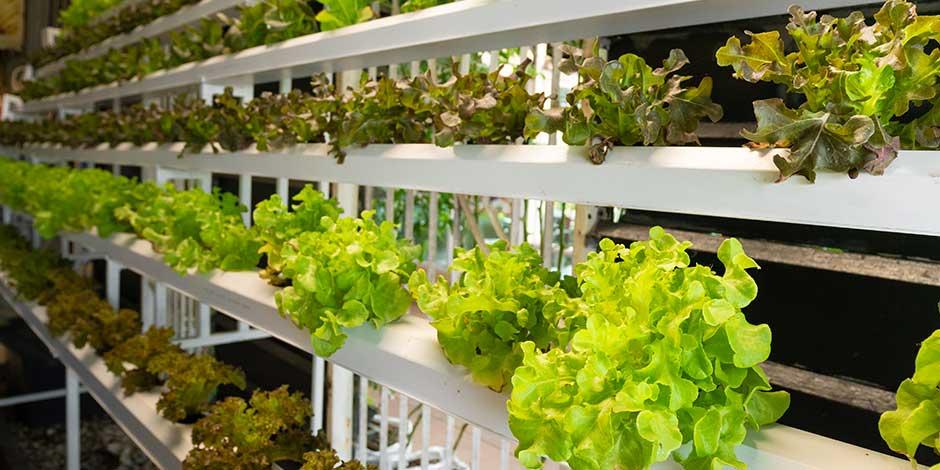We are Shaping the Future! Showcasing Success Stories as We Innovate for a Sustainable Tomorrow

Automated vertical farming is developing rapidly. The vertical farming market is expected to reach $24.11 Billion by 2030*1. The sustainable farming concept was pioneered in the United Kingdom by Intelligent Growth Solutions (IGS), a technology company delivering platforms that create ideal climates for plants and people based on a culture of continuous innovative thinking. IGS features IoT-enabled solutions using artificial intelligence and machine learning. In order to deliver productivity benefits and significantly increase efficiency IGS teamed up with enabling technology partners like the James Hutton Institute*2 and OMRON.
*1 https://www.alliedmarketresearch.com/press-release/vertical-farming-market.html
*2 The James Hutton Institute is a well-respected and globally recognised research organisation deliveringŃĆĆfundamental and applied science to drive the sustainable use of land and natural resources.
It all started with the concern that IGS had with regard to soaring vegetable prices and food shortages creating problems across the globe. They came up with a creative and productive automated vertical farming solution. "Optimizing crop production through automation is a complex process", said Paul Simpson, Sales Manager at OMRON Industrial Europe in the United Kingdom. He went on to say, "Initially, the issues were considered, not as limitations but as a set of prerequisites to move beyond and create practical solutions. Within OMRON we operate as a close-knit team across Europe to create tailor-made solutions for clients. Sustainable solutions that are future-proof enable us to really distinguish ourselves."

ŃĆĆ
Paul also said, "Operating from a joint baseline with sustainability as one of the main features, we all have the same focus and drive to really make an impact. We are aiming to make an impact through superior efficiency, turn-key flexibility, simple operation and easy control. In the end, all project partners actively want to contribute to the lives of people around the globe, and automated farming is a way to do that." Vertical farming requires less land, so it is less disruptive to natural plants and animals. It also means that such turn-key farming solutions can be implemented anywhere; even in hostile climates and without extensive farming knowledge or experience.
ŃĆĆ
Vertical farming is a revolutionary approach to grow crops in vertically stacked layers to make very efficient use of space and create closed loop ecosystems. It often incorporates a weather-independent, controlled-environment agriculture, which is deployed to optimize plant growth and, in many cases, makes use of soilless farming techniques. IoT technology enabled through OMRON's Sysmac Machine Automation Controllers helps to drive IT/OT convergence*. As a result, OMRON was able to achieve the desired ease of operation as well as flexibility, connecting the vertical farming systems to the cloud. Farmers can even download growth recipes for production optimization.
*IT/OT convergence is the integration of information technology (IT) systems with operational technology (OT) systems, allowing them to transmit data to each other.

ŃĆĆ
"To cope with labor shortages, robotic technology like our collaborative robot of the mobile LD-series can be added to vertical farms", said Paul Simpson. Mobile robots are a quick, reliable and hygienic option to transport trays, while fixed, pick & place robots precisely place trays and plants, also automating packaging process. It will be an ideal solution, particularly in the current COVID-19 situation. The pandemic has become a major issue for farmers around the globe, constraining access to agricultural laborers. Furthermore, deploying robots in a factory relieves workers from mundane, dirty and heavy work, so they can focus on more satisfying, less strenuous, value-adding activities.
ŃĆĆ
OMRON and IGS showcased their automated vertical farming solution at COP26 held in Glasgow in 2021. Recognition received for the innovation was overwhelming. At a demonstration site, Tom Vilsack, the United States Secretary of Agriculture, facilitated a live panel discussion, and Debbie Stabenow, the Chairwoman of the U.S. Senate Committee on Agriculture, Nutrition, and Forestry also made an appearance. Furthermore, IGS was able to raise $60 Million in investor capital which would fund projects.

ŃĆĆ
OMRON believes that cloud-based farming is one of the key solutions to a better future for everyone. Making a smart progress in food production is essential for the future of all of us. Vertical farming that requires less land and less disruptive to natural plants and animals driven by OMRON's automation technology is one of such examples. OMRON is pleased to see new initiatives being popping up across the globe to solve the problem, and strives to actively contribute to the progress.